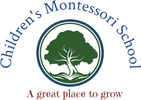The most important period of life is not the age of university studies, but the first one, the period from birth to the age of six. For that is the time when man's intelligence itself, his greatest implement is being formed.
-Dr. Maria Montessori, The Montessori Mind
Q: Where did Montessori come from?
Montessori education was founded in 1907 by Dr. Maria Montessori, the first woman in Italy to become a physical. She based her educational methods on scientific observation of children"s learning processes. Guided by her discovery that children teach themselves, Dr. Montessori designed a "prepared environment" in which children could freely choose from a number of developmentally appropriate activities. Now, nearly a century after Maria Montessori's first casa Dei bambini ("children's house") in Rome, Montessori education is found all over the world, spanning ages from both to adolescence.
Q: What is the difference between Montessori and traditional education?
Montessori emphasizes learning through all five senses, not just though listening, watching, or reading. Children in Montessori classes learn at their own, individual pace and according to their own choice of activities from hundreds of possibilities. Learning is an exciting process of discovery, leading to concentration, motivation, self-discipline, and a love of learning. Montessori classes place children in three-year age groups(3-6,6-9,9-12, and so on), forming communities in which the older children spontaneously share their knowledge with younger ones. Montessori represents and entirely difference approach to education.
Q: What are some advantages of Montessori Education for your child?
Choosing a Montessori environment for your child has many benefits. Known for individually paced learning and fostering independence, the Montessori Method also encourages empathy, a passion for social justice, and a joy in lifelong learning.
Given the freedom and support to question, to probe deeply, and to make connections, Montessori students become confident, enthusiastic, self-directed learners. They are able to think critically, work collaboratively, and act boldly—a skill set for the 21st century.
Montessori education was founded in 1907 by Dr. Maria Montessori, the first woman in Italy to become a physical. She based her educational methods on scientific observation of children"s learning processes. Guided by her discovery that children teach themselves, Dr. Montessori designed a "prepared environment" in which children could freely choose from a number of developmentally appropriate activities. Now, nearly a century after Maria Montessori's first casa Dei bambini ("children's house") in Rome, Montessori education is found all over the world, spanning ages from both to adolescence.
Q: What is the difference between Montessori and traditional education?
Montessori emphasizes learning through all five senses, not just though listening, watching, or reading. Children in Montessori classes learn at their own, individual pace and according to their own choice of activities from hundreds of possibilities. Learning is an exciting process of discovery, leading to concentration, motivation, self-discipline, and a love of learning. Montessori classes place children in three-year age groups(3-6,6-9,9-12, and so on), forming communities in which the older children spontaneously share their knowledge with younger ones. Montessori represents and entirely difference approach to education.
Q: What are some advantages of Montessori Education for your child?
Choosing a Montessori environment for your child has many benefits. Known for individually paced learning and fostering independence, the Montessori Method also encourages empathy, a passion for social justice, and a joy in lifelong learning.
Given the freedom and support to question, to probe deeply, and to make connections, Montessori students become confident, enthusiastic, self-directed learners. They are able to think critically, work collaboratively, and act boldly—a skill set for the 21st century.
- Each child is valued as a unique individual. Montessori education recognizes that children learn in different ways, and accommodates all learning styles. Students are free to learn at their own pace, each advancing as he is ready, guided by the teacher and an individualized learning plan.
- Beginning at an early age, Montessori nurtures order, concentration, and independence. Intentional classroom design, materials, and daily routines support the student’s emerging “self-regulation” (the ability to educate one’s self, and to think about what one is learning), in toddlers through adolescents.
- Students are part of a close, caring community. The multi-age classroom—typically spanning 3 years—re-creates a family structure. Older students enjoy stature as mentors and role models; younger children feel supported and gain confidence about the challenges ahead. Teachers model respect, loving kindness, and a peaceful conflict resolution.
- Montessori students enjoy freedom within limits. Working within parameters set by their teachers and the classroom community, students are active participants in deciding what their focus of learning will be.
- Students are supported in becoming active seekers of knowledge. Teachers provide environments where students have the freedom and the tools to pursue answers to their own questions. Internal satisfaction drives the child’s curiosity and interest and results in joyous learning that is sustainable over a lifetime.
- Self-correction and self-assessment are an integral part of the Montessori classroom approach. As they mature, students learn to look critically at their work, and become adept at recognizing, correcting, and learning from their errors.
- Montessori supports social-emotional skills. Contemporary research supports the 100-year-old Montessori Method's effectiveness, indicating that children who learn in Montessori classrooms demonstrate stronger social-emotional skills in many areas than children in more traditional environments.
